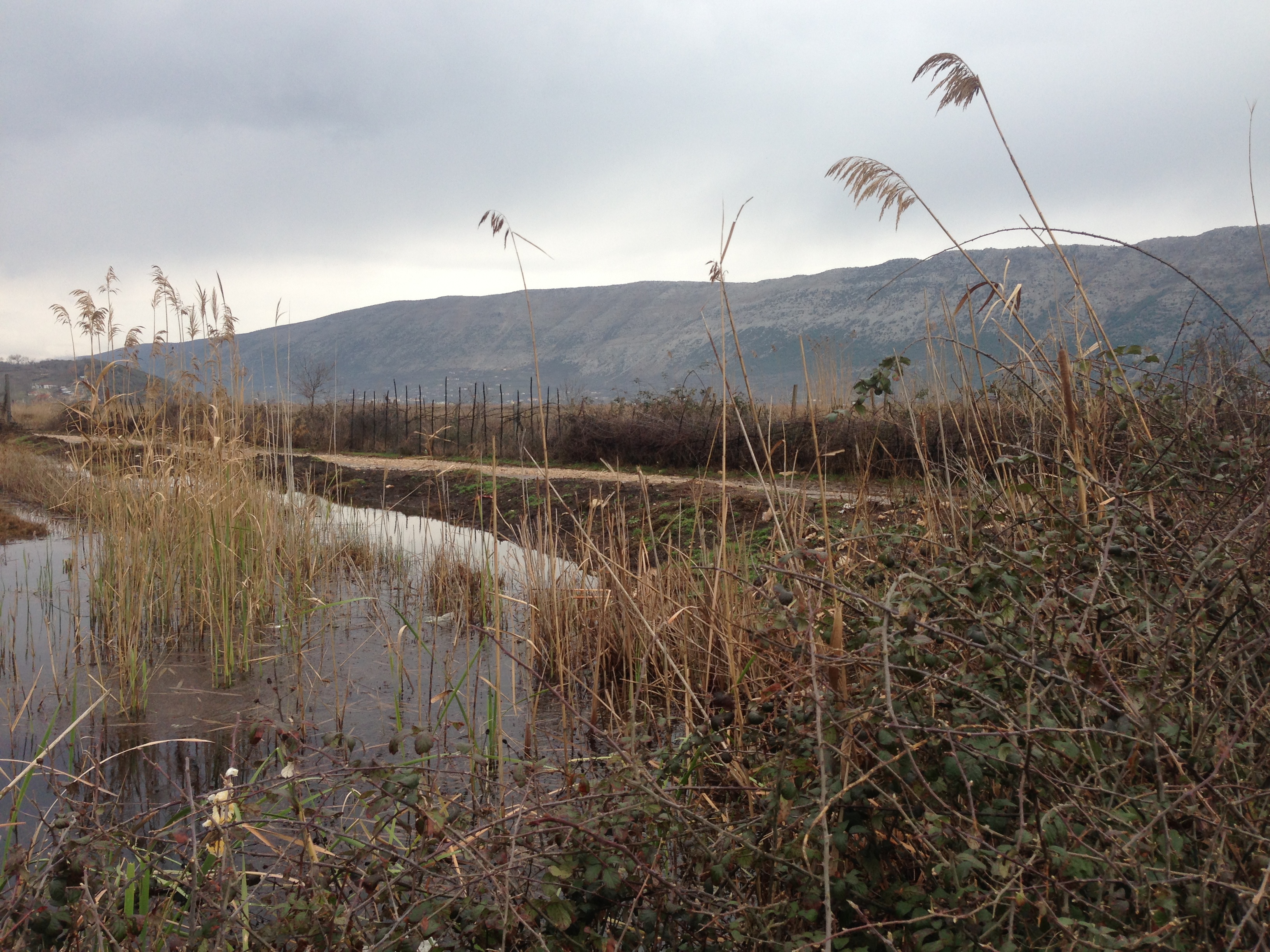Come with me on a journey to northern Albania, an area known for legendary hospitality, ancient citadels, and blood feuds. In many villages in the north the people are not governed by 21st century european law, but a law that is much older called the Kanun.
The Kanun, or canon, is a 500-year-old code of conduct covering every aspect of medieval life, from births and marriages to hunting and grazing rights and written alongside the duties of a village blacksmith, and the penalties for allowing a goat to stray onto a neighbour's land, it lays out detailed procedures for blood feuds, with a chillingly loose definition of an eye-for-an-eye. When someone is killed, revenge can be exacted not just against the killer himself, but all males in his extended family clan.
According to the Kanun, one can be killed only outside of the walls of one's own home. As a result, men who have killed often go into hiding or in some cases are jailed by the state. In their absence, elder sons take on responsibility for the conflict, often becoming prisoners of their own homes, unable to study or live a normal life. We see wives stepping in for their husbands, becoming the household breadwinners. Historically, girls and women have not been the targets of the vengeance but there have been some rare cases. According to some EU estimates, there are as many as 1,500 families and 800 children currently in isolation in Albania due to blood feuds.
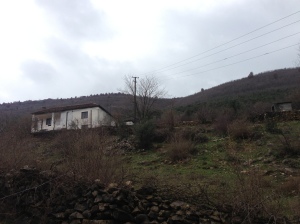
Visionfund Albania, where I am currently based as a Kiva fellow, does a lot of work in this region where many of the families are touched by blood feuds.
Last week I had the opportunity to see this area for myself when we went to Lezhe to meet with two different borrowers. The two clients we were meeting with had been long term clients of two different programs through VFA and we were going out to take video, pictures and capture their stories of success to help secure additional funding for VFA. It was my first time that I had to do client interviews and I was nervous. I was right to be nervous! But more on that in a bit...
The first borrower we met with was Tone, one of our value chain clients, which means when she took the loan to buy dairy goats she also got connected with quality supplier of goats and a market to sell her products. A lot of her goats are now pregnant and I can't wait to come back later in the spring and see cute goat babies!
I made my first mistake here in that I didn't really check how clean the lens was on the video camera until half way through the shots... lesson #1 learned!
-
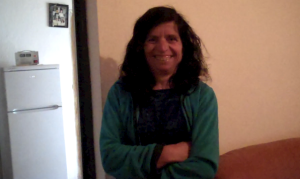
- Tone welcoming us into her home
-
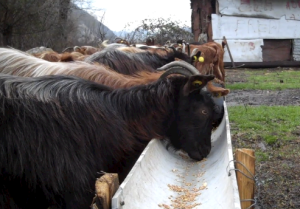
- It's feedin' time! (right before a goat head knocks me out of the way)
It was about 8:15 am when we arrived on Tone's farm but her and her husband were very insistant that we should join them in drinking some homemade raki (the local liquor which I convinced would make an excellent drain cleaner). I had been warned by albanian friends that the trick is to drink the raki as slowly as possible but as soon as your cup is empty they will refill it. I am glad I didn't have to learn this lesson firsthand!
-
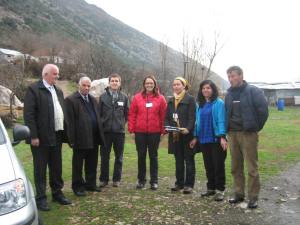
- Loan officers, VFA staff, a peacecorp's volunteer, Tone and husband, and me hanging out on the goat farm.
-
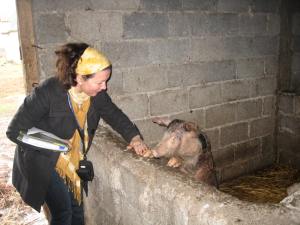
- Bianca, VFA's Kiva Coordinator, making friends with the family pig.
-
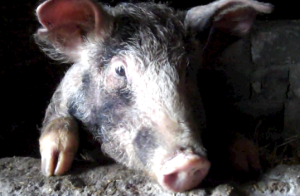
- This pig was a total ham for the camera (sorry couldn't resist but he loved it!)
After leaving Tone's house out next stop was the courthouse to interview a former client's daughter. The project we were working on was telling a success story of someone who had been a borrower more than ten years ago and showing the total effect that the loan had on the lives of people in the borrowers family. Gjovalin got his start as a village farmer with a dairy cow operation, ten years later he is now an art teacher that also owns a beekeeping facility. His four children through the profit brought in by his business were able to have a good education that lead them to get great jobs, including his daughter who works at the local courthouse. My travel insurance warnings had said to avoid all contact with the albanian police so I felt a little strange strolling past the van with an open back full of people in handcuffs and into the courthouse, but I figured I wasn't in any real danger....
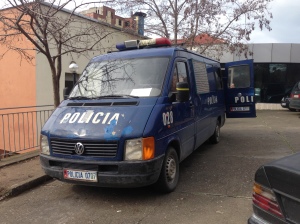
Past the convict van, I really enjoyed talking with Gjovalin's daughter Ariet and hearing about her life before and after the loans. While the first loan from VFA is only one piece of the success story, it is very cool to see the impact 10 years down the road.
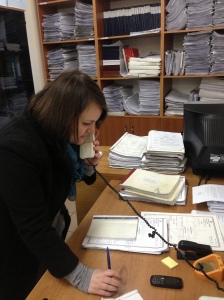
After visiting Ariet we headed out to the beekeeping operation to see the business firsthand.
There were hives and bees everywhere!
-
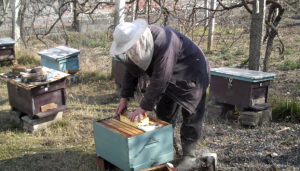
- Look ma' - bare hands!
-
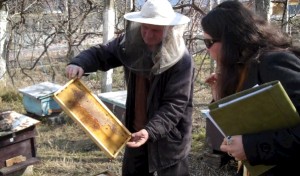
- Check out all of that honey!
-
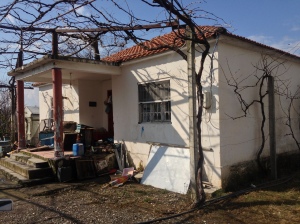
- This was the house before the beekeeping operation started...
-
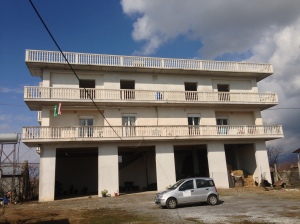
- This is the "after" house that was built with the profits...
This is where I learned my final lesson of the day. In looking around for a place to film the sit down interview portion of the video the sunniest spot happened to be by a fence with chickens and hay in the background. Having spent the last 6 years living in Bellingham, WA, chickens are a common occurrence in the trendy neighborhood where I was living, so I didn't think anything of their presence, they were not even going to be in the frame of the shot. Gjovalin however was deeply offended, to the point where he almost refused to do the interview. He kept saying that I wanted him to look like a peasant, and that he wasn't a peasant he was an art teacher. We had to do some serious apologizing and groveling. Did I mention this is all happening in rapid albanian? So while I could tell something is wrong but I had no idea what exactly was happening. Hours of work already done with this project and me and some thoughtless chickens almost blew it.
-
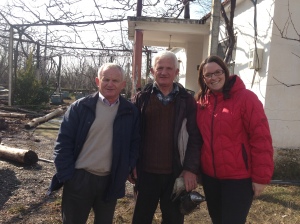
- Gjovalin, his employee and myself right before the chicken incident.
In a region famous for blood feuds over honor and family dignity I really should have been a little more careful!
In the end, he decided that he would do the interview after all, but I will never forget how deeply embarrassed I felt for not being more conscious of how I would choose to portray him keeping in mind the role of pride and achievement in his life.

